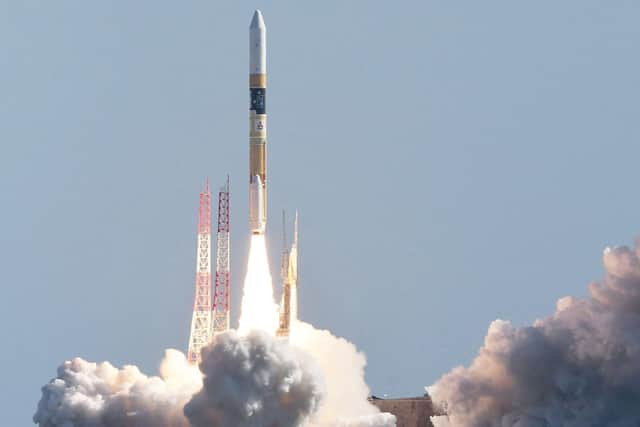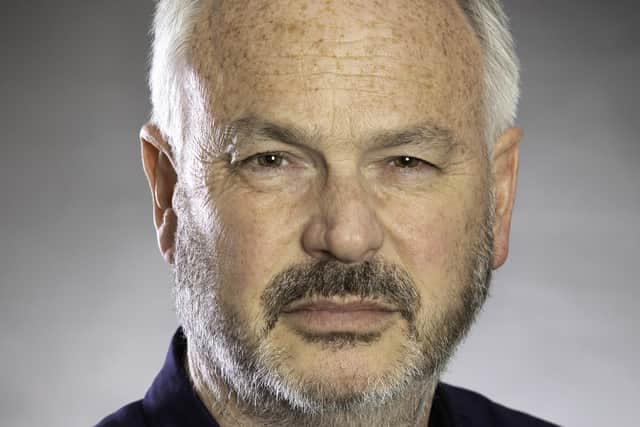Tim Marshall on how politics and power are playing out in the space race
His specialism has always been in foreign affairs and international diplomacy, but as it became clear that was beginning to play out outside of Earth too, Tim started to explore relations in the context of space.
In doing so, the 64-year-old from Otley, has also pursued a personal interest in the universe and how science has helped today’s society to understand and explore more of it. His learnings on all fronts are presented in his latest book, The Future of Geography: How Power and Politics in Space Will Change Our World, which was released earlier this year.
Advertisement
Hide AdAdvertisement
Hide Ad“It’s about international relations but about how international relations now takes place in space,” he muses, from his home in West London. “Space mirrors, sadly, the tensions which exist down here on earth. For example, the competition between China and the USA is also being played out in outer space.


“Industrialised countries realise just how tied their economies are to what is happening in space, especially with satellites...As for the moon, all the major companies, mining and energy, and all the major industrial powers, they can’t risk not being there, in case being there turns out to be the equivalent of getting your hands on the oil in the early 20th century.”
Marshall will be talking on the topic in an appearance at Ilkley Literature Festival next month. After a journalism career of conflict reporting, which he describes as “scary and exhausting in equal measure, he’ll be casting his gaze into the world of astropolitics, looking at how the space race is not only changing the face of global politics but what that actually means in reality for humans on earth.
That’s not, he stresses, a trip to Mars - at least not for most of us. But what is happening in space does have huge knock on effects for life in the 21st century. Satellites there, to give one example, are being used to measure sea temperatures as part of charting climate change. They’re allowing small scale farmers in Africa to know when and where to plant crops to get the optimum from them. They help forecasters know where hurricanes are gathering force and when they’re likely to hit.
Advertisement
Hide AdAdvertisement
Hide Ad"And it would be difficult to have Uber without satellites,” Marshall continues. “They have really revolutionised many industries. They’ve allowed us to communicate with each other. They’re what gets your food groceries delivered to your home.”


For most of the more than 90 countries now reported to be operating in space, it is the use of satellites that have put them there, Marshall says. But there are, of course, a number who are heavily involved in further space exploration – the United States, Russia, China and India to name just a few. Marshall believes the coming decade will bring an acceleration of deep space exploration, a boom in satellites, key to industry, communications, television and delivery services and more activity on the moon.
The lunar south pole is a key focus for future missions – and potential space bases. “There’ll be competition to build [bases] in the best location which will be wherever they find is the most water ice and metals…The metals that drive the 21st century technology on earth and the metals that we’re running out of here or which are scarce. If there’s a supply on the moon, then the major companies and countries will be trying to get it.”
The moon could also provide a “jumping off” point for greater exploration of Mars, Marshall says. “I think it’s probable that in the 2030s that humans will land on Mars and I think it’s even possible that by the end of that decade, we will have rudimentary bases on Mars. But as for thousands of people [going up there], no,” he says.
Advertisement
Hide AdAdvertisement
Hide AdHe is optimistic, however, that more people will engage with the space race, thanks to high-profile missions. With its Artemis missions for example, NASA says it will land the first woman and first person of colour on the moon, establish the first long-term presence there and then send the first astronauts to Mars.
“I think we’re going to see a renaissance of interest and engagement,” Marshall says. “With the first breakthroughs in space, there was huge engagement. Then it kind of fell away again with slight rises of interest.
"But I think when it comes to things like the Americans walking on the moon [again], I think we will see a global engagement, because this is a new generation. If you’re under 50, you’ve never seen people walking on the moon live - and that’s a lot of people.”
Given his background, Marshall is particularly interested in space from the perspective of international relations. But what also piques his interest is what fascinates many others too – its sheer enormity.
Advertisement
Hide AdAdvertisement
Hide Ad"I think we’ve all gazed at this unknown above us,” he reflects. “And add to that the technological brilliance that is required to get there...When you look at what is required to break out of the atmosphere with human beings and machinery on board, it’s such an incredible technological achievement, among the pinnacles….
"After so many thousands of years of gradually learning maths and science, this stands amongst the most amazing things we’ve ever done.
“When you put those two things together, that sheer wonder of the majesty of the universe and the sheer brilliance of the technology to even visit a small part of it, that explains such fascination.”
Tim Marshall is at Ilkley Literature Festival on Saturday, October 14 at 7.30pm with his talk Power and Politics in Space. For tickets, visit ilkleyliteraturefestival.org.uk
